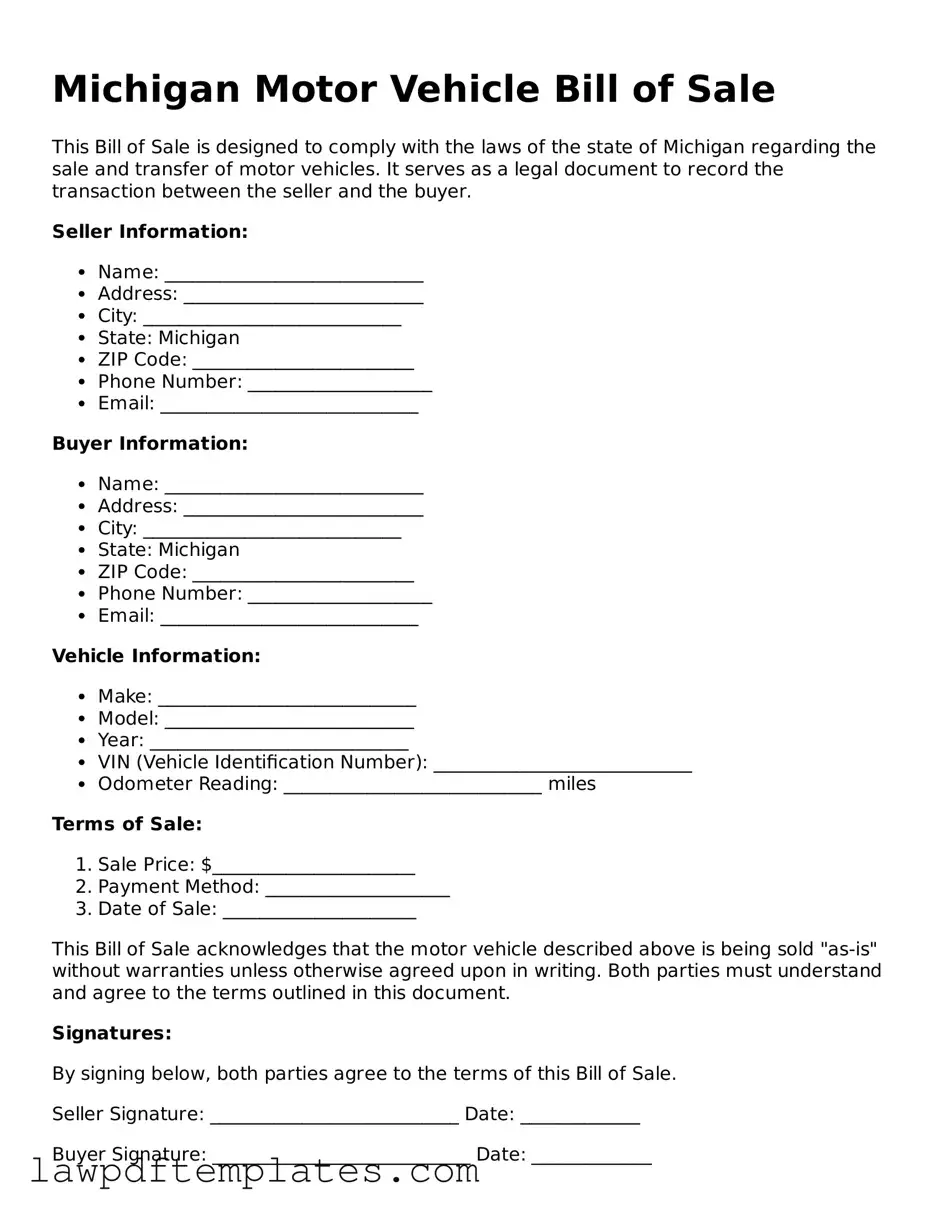Free Motor Vehicle Bill of Sale Template for the State of Michigan
Form Breakdown
| Fact Name | Description |
|---|---|
| Purpose | The Michigan Motor Vehicle Bill of Sale form is used to document the sale or transfer of ownership of a motor vehicle in Michigan. |
| Governing Law | This form is governed by the Michigan Vehicle Code, specifically MCL 257.233. |
| Required Information | The form requires details such as the vehicle identification number (VIN), make, model, year, and odometer reading at the time of sale. |
| Seller and Buyer Details | Both the seller and buyer must provide their names, addresses, and signatures to validate the transaction. |
| Notarization | While notarization is not required, it is recommended to enhance the document's authenticity. |
| Tax Implications | The buyer may need to pay sales tax based on the purchase price of the vehicle when registering it. |
| Record Keeping | Both parties should keep a copy of the Bill of Sale for their records, as it serves as proof of the transaction. |
| Use in Title Transfer | The completed form is often required when applying for a new title in the buyer's name. |
| Availability | The Michigan Motor Vehicle Bill of Sale form can be obtained online or at local Secretary of State offices. |
Sample - Michigan Motor Vehicle Bill of Sale Form
Michigan Motor Vehicle Bill of Sale
This Bill of Sale is designed to comply with the laws of the state of Michigan regarding the sale and transfer of motor vehicles. It serves as a legal document to record the transaction between the seller and the buyer.
Seller Information:
- Name: ____________________________
- Address: __________________________
- City: ____________________________
- State: Michigan
- ZIP Code: ________________________
- Phone Number: ____________________
- Email: ____________________________
Buyer Information:
- Name: ____________________________
- Address: __________________________
- City: ____________________________
- State: Michigan
- ZIP Code: ________________________
- Phone Number: ____________________
- Email: ____________________________
Vehicle Information:
- Make: ____________________________
- Model: ___________________________
- Year: ____________________________
- VIN (Vehicle Identification Number): ____________________________
- Odometer Reading: ____________________________ miles
Terms of Sale:
- Sale Price: $______________________
- Payment Method: ____________________
- Date of Sale: _____________________
This Bill of Sale acknowledges that the motor vehicle described above is being sold "as-is" without warranties unless otherwise agreed upon in writing. Both parties must understand and agree to the terms outlined in this document.
Signatures:
By signing below, both parties agree to the terms of this Bill of Sale.
Seller Signature: ___________________________ Date: _____________
Buyer Signature: ____________________________ Date: _____________
This document serves as a legal agreement and should be kept for personal records.
Common mistakes
When completing the Michigan Motor Vehicle Bill of Sale form, individuals often make several common mistakes that can lead to complications down the line. One frequent error is failing to provide complete information about the vehicle. Essential details such as the Vehicle Identification Number (VIN), make, model, and year must be accurately recorded. Omitting any of these can cause confusion and may even hinder the transfer of ownership.
Another mistake involves incorrect spelling or typographical errors in names or addresses. It is crucial that the names of both the buyer and seller are clearly written and spelled correctly. Any discrepancies can result in issues with title transfers or future legal disputes. Therefore, double-checking for accuracy is a simple yet vital step.
Many people also overlook the importance of including the sale price. The Michigan Bill of Sale requires that the purchase price be documented. If this information is missing, it can create problems when registering the vehicle or calculating taxes. It is advisable to ensure that the sale price is clearly stated and matches any agreed-upon terms.
Additionally, individuals sometimes forget to sign the form. Both the buyer and seller must provide their signatures to validate the transaction. Without these signatures, the Bill of Sale may be considered incomplete, which could lead to difficulties in proving ownership later on.
Another common oversight is neglecting to date the form. A date is crucial for establishing when the sale took place. This information can be important for legal reasons, including determining liability in case of accidents or disputes regarding the vehicle’s condition at the time of sale.
People often fail to provide accurate odometer readings as well. The odometer reading must reflect the vehicle's mileage at the time of sale. If this information is inaccurate or omitted, it could lead to misunderstandings about the vehicle's condition and value.
Furthermore, some individuals do not retain a copy of the completed Bill of Sale. Keeping a copy is essential for both parties, as it serves as proof of the transaction. Without this documentation, either party may find themselves in a difficult position should any issues arise later.
Lastly, buyers and sellers sometimes neglect to understand the implications of the Bill of Sale. This document is not just a formality; it represents a legal agreement between the parties involved. Failing to grasp the significance of the Bill of Sale can lead to misunderstandings about rights and responsibilities after the transaction is completed.
Discover More Motor Vehicle Bill of Sale Templates for Specific States
How to Gift a Car in Nj - In some cases, the form may also reflect any agreed-upon trade or exchange of vehicles.
Free Bill of Sale Georgia - Important for maintaining accurate vehicle records.
For those looking to streamline their invoicing process, the Free And Invoice PDF form is an essential tool that not only simplifies billing but also enhances professional communication. Utilizing resources like Fast PDF Templates can further improve the efficiency and effectiveness of your invoicing procedures.
Ohio Car Title - It's advisable to complete the Bill of Sale in the presence of both parties to ensure transparency.
What Should a Bill of Sale Look Like - The bill of sale can also lay out details regarding any post-sale obligations or agreements.
